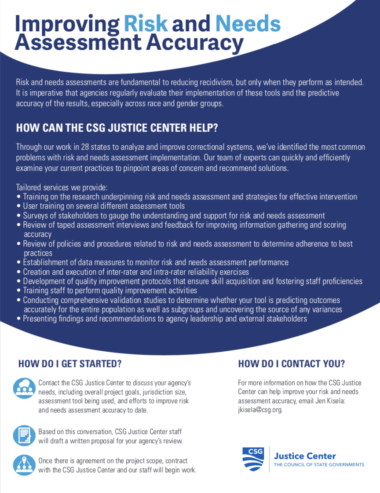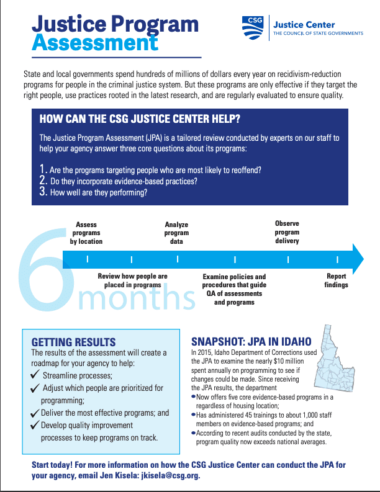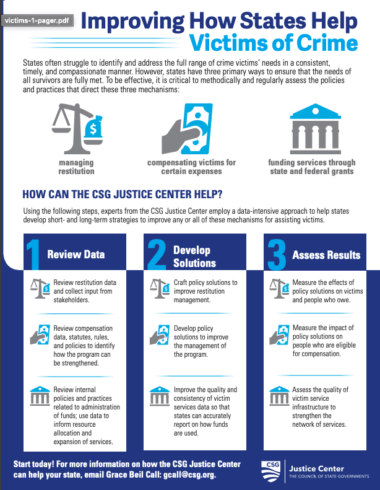Partner With Us
In addition to federal partnerships that fund our work in jurisdictions across the country, the CSG Justice Center often contracts directly with various states, counties, and tribal communities to help analyze and improve elements of their criminal justice systems. Below are several ways our experts can work directly with your state or community
Improving Risk and Needs Assessment Accuracy
Risk and needs assessments are fundamental to reducing recidivism, but only when they perform as intended. It is imperative that agencies regularly evaluate their implementation of these tools and the predictive accuracy of the results, especially across race and gender.
How can the CSG Justice Center help?
Through our work in 28 states to analyze and improve correctional systems, we’ve identified the most common problems with risk and needs assessment implementation. Our team of experts can quickly and efficiently examine your current practices to pinpoint areas of concern and recommend solutions. Tailored services we provide are as follows:
- Training on the research underpinning risk and needs assessment and strategies for effective intervention
- User training on several different assessment tools
- Surveys of stakeholders to gauge the understanding and support for risk and needs assessment
- Review of taped assessment interviews and feedback for improving information gathering and scoring accuracy
- Review of policies and procedures related to risk and needs assessment to determine adherence to best practices
- Establishment of data measures to monitor risk and needs assessment performance
- Creation and execution of inter-rater and intra-rater reliability exercises
- Development of quality improvement protocols that ensure skill acquisition and fostering staff proficiencies
- Training staff to perform quality improvement activities
- Conducting comprehensive validation studies to determine whether your tool is predicting outcomes accurately for the entire population, as well as subgroups, and uncovering the source of any variances
- Presenting findings and recommendations to agency leadership and external stakeholders
How do I get started?
- Contact the CSG Justice Center to discuss your agency’s needs, including overall project goals, jurisdiction size, assessment tool being used, and efforts to improve risk and needs assessment accuracy to date.
- Based on this conversation, CSG Justice Center staff will draft a written proposal for your agency’s review.
- Once there is agreement on the project scope, contract with the CSG Justice Center and our staff will begin work.
How do I contact you?
For more information on how the CSG Justice Center can help improve your risk and needs assessment accuracy, email Jen Kisela at jkisela@csg.org.
Justice Program Assessment
State and local governments spend hundreds of millions of dollars every year on recidivism-reduction programs for people in the criminal justice system. But these programs are only effective if they target the right people, use practices rooted in the latest research, and are regularly evaluated to ensure quality. Through the Justice Program Assessment, the CSG Justice Center can help agencies answer critical questions and create a roadmap to improving their programs.
How can the CSG Justice Center help?
The Justice Program Assessment (JPA) is a tailored review conducted by experts on our staff to help your agency answer three core questions about its programs:
- Are the programs targeting people who are most likely to reoffend?
- Do they incorporate evidence-based practices?
- How well are they performing?
Getting Results
The results of the assessment will create a roadmap for your agency to help
- Streamline processes;
- Adjust which people are prioritized for programming;
- Deliver the most effective programs; and
- Develop quality improvement processes to keep programs on track.
Snapshot: JPA in Idaho
In 2015, Idaho Department of Correction used the JPA to examine the nearly $10 million spent annually on programming to see if changes could be made. Since receiving the JPA results, the department
- Now offers five core evidence-based programs in all facilities, allowing people to access programs regardless of housing location;
- Has administered 45 trainings to approximately 1,000 staff members on evidence-based programs; and
- Exceeds national averages in program quality, according to recent audits conducted by the state, program quality now exceeds national averages.
Improving How States Help Victims of Crime
States often struggle to identify and address the full range of crime victims’ needs in a consistent, timely, and compassionate manner. However, states have three primary ways to assist survivors: managing restitution, compensating victims for certain expenses, and funding services through state and federal grants. Experts from the CSG Justice Center can employ a data-intensive approach to help states develop short- and long-term strategies to improve any or all of these mechanisms for assisting victims;
- Managing restitution
- Compensating victims for certain expenses
- Funding services through state and federal grants
How can the CSG Justice Center help?
Using the following steps, experts from the CSG Justice Center employ a data-intensive approach to help states develop short- and long-term strategies to improve any or all of these mechanisms for assisting victims.
Review Data
- Review restitution data and collect input from stakeholders.
- Review compensation data, statutes, rules, and policies to identify how the program can be strengthened.
- Review internal policies and practices related to administration of funds; use data to inform resource allocation and expansion of services.
Develop Solutions
- Craft policy solutions to improve restitution management.
- Develop policy solutions to improve the management of the program.
- Improve the quality and consistency of victim services data so that states can accurately report on how funds are used.
Access Results
- Measure the effects of policy solutions on victims and people who owe.
- Measure the impact of policy solutions on people who are eligible for compensation.
- Assess the quality of victim service infrastructure to strengthen the network of services.
Improving County Justice and Behavioral Health Systems
The number of people who have mental illnesses in U.S. jails has reached crisis levels, and many jails have become de facto mental health care facilities. But often, counties struggle to collect adequate data on the number of people who have mental illnesses in their jails or to use it to drive change. Our team uses a unique approach to develop tailored, data-driven plans to help reduce the prevalence of mental illnesses in their jails, and we’re currently developing plans to offer our services through individual partnerships with jurisdictions. Check back soon for more information.













